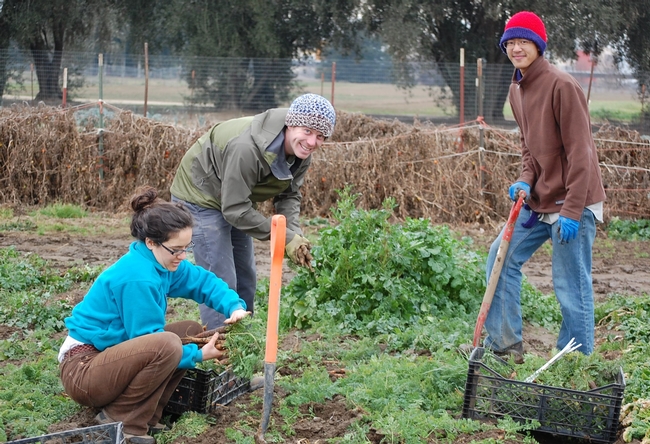More young people see future in farming
The USDA is gearing up for the 2012 Census of Agriculture, the complete count it makes every five years of U.S. farms and ranches and the people who operate them. The agricultural census provides a fascinating look at farming demographics: How old are they? Where do they live? What do they grow?
Most experts believe the census will show a trend towards the green – not just green as in sustainable, local and small-scale - but also green as in greenhorn. It seems more people from non-farming families are seeking farming careers. (You can read an Associated Press story on the topic here.)
That is especially good news in California, where the current average age of a farmer is nearly 60. Farming is a $37.5 billion business in California employing 800,000 people and providing 12 percent of the nation’s agricultural exports. With the world population forecast to grow from 7 billion to 9 billion by 2050, the demand for California’s food production will continue to grow.
Will California’s farmers be able to meet that need? The UC Davis Department of Plant Sciences is helping by providing cutting-edge research and educating a whole new crop of young people eager to take on the back-breaking work of farming the land.
“We’re definitely seeing an increased interest in farming among students,” says Crop Physiology Professor Ted DeJong, a faculty adviser for the department’s Horticultural and Agronomy Graduate Group, a popular major for students interested in farming and other aspects of agriculture. Indeed, student enrollment in horticulture and agronomy has increased from 53 in fall 2008 to 92 in fall 2011.
“Yes, I do think more young people are interested in farming,” said Gina Garland, who received her master's degree in horticultural and agronomy from UC Davis last spring. “Food is so important and it’s not very secure right now, with climate change and all. Many of us are interested in trying to find ways to make farming work in our changing environment.”
Garland is now working with AmeriCorps and a non-profit group in Albuquerque, N.M., farming and helping others farm. She might not become a farmer herself, choosing, perhaps, to seek a Ph.D. (hopefully, she says, at UC Davis), conducting research to help others farm more profitably and sustainably.
Meanwhile, at the UC Davis Agriculture Sustainability Institute Student Farm, young people are hoeing weeds, harvesting carrots and learning the joys and challenges of farming.
“It’s good to know where your food comes from,” says Eric Lynn, and undergraduate plant sciences student. “I think that’s what attracts a lot of us to farming.”
The high cost of farmland in California makes it tough for young people to enter the business, as noted in this recent story in the Western Farm Press. But many are finding ways to make farming pay by producing vegetables for sale at local restaurants, for example, or marketing their produce online. From urban roof-top gardening to using the latest in conservation agricultural practice, a new, younger breed of farmer is heeding the call. You can read more about that in this recent story on sfgate.com.
Also, have you heard about the Center for Land-Based Learning? Located in Winters, just west of campus, this non-profit is dedicated to creating the next generation of farmers and teaching California’s youth about the importance of agriculture and watershed conservation. You can learn more at: http://landbasedlearning.org/




Posted by Carolyn on January 26, 2012 at 10:29 AM